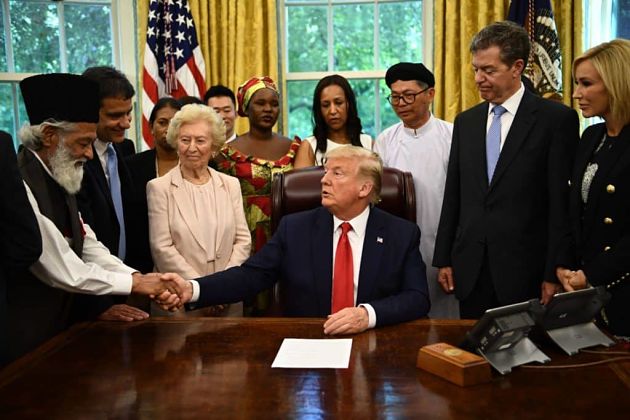Donald Trump’s relationship with the Islamic factor is becoming as contradictory as he himself. Earlier today we wrote about how Trump received representatives of the Uighur community in the White House, doing something that no leader of a Muslim country has ever done. But there was another interesting aspect to this meeting – besides the Chinese Buddhists and Falun Gong representatives already mentioned, there were also representatives of the Pakistani Ahmadiyya community. One of them took the opportunity to complain to Trump about the persecution of his community in Pakistan.
The Ahmadiyya community is comfortable with the fact that they can freely call themselves Muslims in the United States, where the “Ahmadiyya Muslim Community” is legally recognized, but they are denied this right in Pakistan, where Ahmadiyyas were officially declared non-Muslims in 1974. However, the United States and Pakistan are countries built on different foundations. The United States is a liberal secular republic where religion is legally separated from the state, with Christian cultural roots and a strong Christian factor in politics and society. The Islamic factor definitely does not play a constituting role in the United States, even on such an informal level as the Christian factor. It is therefore not surprising that in a country where the state does not play the role of religious arbiter, anyone can call himself anything: Mormons, who have no connection to dogmatic Christianity, can call themselves Christians, and various syncretic sects such as the Nation of Islam or Ahmadis can call themselves Muslims.
Pakistan is officially an Islamic republic and was created as a state for the Muslims of British India during its partition into two countries. The Muslim community in this country of nearly 200 million is extremely heterogeneous, including representatives of different, sometimes fiercely competitive schools, interpretations, movements, and communities, conditionally categorized as Sunni, as well as Shiite schools and sects, including extremist ones such as the Ahbaris. The latter has been and remains a problem, given the disproportionate influence of Shiite clans, who are a minority in Pakistan, on its politics. However, both Sunni and Shia have always been clear about one thing: the followers of the Ahmadiyya movement, who violated the principle of the finality of the prophethood with Muhammad, may Allah bless him and greet him, and considered Mirza Ghulam Ahmad a new prophet, are not considered Muslims by either group. Thus, while Ahmadis can exist in Pakistan, they are required not to call themselves Muslims. And, without compromising their principles, they cannot hold government positions that require them to take an oath, part of which includes belief in Muhammad, may Allah bless him and greet him, as the last prophet.
By the way, it should be noted that this is not something that exists today only in the East – remember that in one of the oldest democracies of the West, the United Kingdom, the monarch officially heads the Anglican Church, and only its representative can become prime minister, for example, not a Catholic, Jew, Muslim, or even an Ahmadi. Another example is Israel, which is closely associated with Trump and his supporters, and which was created as a refuge from the persecution of Muslims – only followers of Orthodox Judaism have official status there, while representatives of so-called progressive Judaism do not have such rights.
However, the invitation of Uighur Sunnis and Pakistani Ahmadis to the White House is not so much a manifestation of a consistent policy to protect all minorities (since they did not invite Shiite representatives from Saudi Arabia or Bahrain, not to mention progressive Jews from Israel), but rather a manifestation of a consistent geopolitical policy. It is China that is gaining strength, not Russia, whose rusty missiles, disintegrating planes and burning submarines are becoming America’s main strategic adversary. In recent years, Pakistan has clearly reoriented itself toward an alliance with China, preferring it to an alliance with Washington, as we have written before. It is therefore not surprising that the persecution of religious minorities is presented to Pakistan in the same way as it is to China – it is unlikely to be motivated by sincere sympathy for the Uighurs or Ahmadis or a consistent defense of human rights, but rather by the pragmatic interests of the United States, which uses them as instruments of protection.
These circumstances should not be understood as a reason to be disappointed in the protection of the Uyghurs from the genocidal policies of the Han Communists. The Uyghur problem is real and extremely acute, and if only the United States and the West pay attention to it based on their own interests, it does not mean that their support in this matter should not be accepted when Muslim countries dependent on Beijing remain silent on this issue. It is only necessary to understand that in a situation where the Islamic world lacks unity and geopolitical self-sufficiency, and scattered Muslim peoples and countries are forced to maneuver between non-Muslim power centers, every such problem has its downside and a price to pay for such cooperation.
These are the sad consequences of the lack of real Islamic solidarity among Muslim countries and their foreign policies and development strategies based on it.

